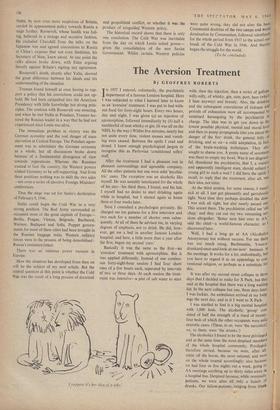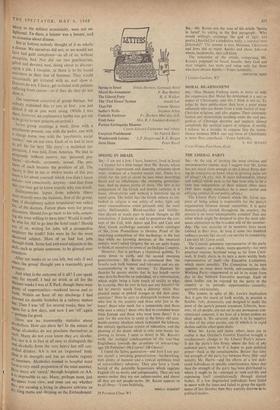The Aversion Treatment
By GEOFFREY ROBERTS IT N 1957 I entered, voluntarily, the psychiatric department of a famous London hospital. Here I was subjected to what I learned later to know as an 'aversion' treatment. I was put to bed with- out food for forty-eight hours. Every two hours, day and night, I was given (a) an injection of apomorphine, followed immediately by (b) half a tumblerful of neat whisky or gin. (It was all on the NHS, by the way.) Within five minutes, nearly but not quite every time, violent nausea and vomit- ing were caused. Between the spells I read and dozed. I knew enough psychological jargon to recognise this as Pavlovian 'conditioned reflex' stuff.
After the treatment I had a pleasant rest in pleasant surroundings and agreeable company. All the other patients but one were mild 'psychia- tric' cases. The exception was an alcoholic like myself. He was amiably intoxicated for the whole of his stay—his third there, I found, and his last. I myself had no desire to start drinking again while in hospital, but I started again at home three or four weeks later.
Next I consulted a psychologist privately. He charged me ten guineas for a first interview and two each for a number of shorter ones subse- quently. At all of them he advised me, in varying degrees of emphasis, not to drink. He did, how- ever, get me a bed in another famous London hospital, and here, a little more than a year after the first, began my second 'cure.'
Basically it was the same as the first—an `aversion' treatment with apomorphine. But it was applied differently. Instead of one continu- ous forty-eight-hour session I had four short ones of a few hours each, separated by intervals of two or three days. At each session the treat- ment was intensive--a pint of salt water to start with, then the injection, then a series of gallops. willy-nilly, of whisky, gin, rum, port, beer (which I hate anyway) and brandy. Also, the drinkin3 and the subsequent convulsions of sickness and periods of exhaustion were all accompanied IV sustained haranguing by the Psychiatrist fl charge. The idea was to get you down to the lowest possible physical, mental and moral level and then to pump propaganda into you about the danger of the firs drink, the general folly of drinking, and so on—a mild adaptation, in fact, of the brain-washing techniques. They MO sought to shame you. A pretty nurse of seventeen was there to empty my bowl. Was it not disgrace. ful, thundered the psychiatrist, that I, a mature and apparently intelligent man, should subject a young girl to such a task? I did have the spirit, I recall, to reply that the treatment, after all, Was their idea, not mine.
At the third session, for some reason, 1 wasn't sick at all. I just got pleasantly and garrulouslY tight. Next time they perhaps doubled the dose. I was sick all right, but also nearly passed out. This scared them. The psychiatrist called me 'old chap,' and they cut out my two remaining ses. sions altogether. 'Better turn him over to AA,' said the chief—a world-famous character, as I discovered later.
Well, I had a long go at AA (Alcoholics Anonymous) but without success. For me there was too much smug, Buchmanite, 1-was-a- drunkard-once-and-look-at-me-now' business 3t the meetings. It works for a lot, undoubtedly, but you have to regard it as an appendage to con- ventional. religion, or perhaps as a substitute for this.
It was after my second street collapse in three days that I decided to make for X Park, but they said at the hospital that there was a long waiting list. In the next collapse but one, three days later. I was luckier. An ambulance arrived at my lodg- ings the next day, and in it I went to X Park.
I was startled to find it a big mental hospital, with 1,000 beds. The alcoholic 'group' con- sisted of half the strength of a ward of twentY- four beds of which the other occupants were mild neurotic cases. (These, to us, were 'the narcotics; we, to them, were 'the drunks.') The alcoholics I found to be the most privileged and at the same time the most despised member9 of the whole hospital community. Privileged. therefore envied, because we were, after ally while off the booze, the most rational, and were on the whole treated accordingly; also because we had four or five nights out a week, going to AA meetings anything up to thirty miles away in a hospital bus. Despised because, while nominallY patients, we were after all only a bunch af drunks. Our fellow-patients, ranging from blank
idiocy to the mildest eccentricity, were not en- lightened. To them, a boozer was a boozer, and no nonsense about disease.
But at bottom nobody thought of it as wholly a disease. We ourselves did not, or we would not have had guilt complexes—as all of us, without exception, had. Nor did our two psychiatrists, gifted and devoted men, doing about as discour- aging a job, I imagine, as there is to be found anywhere in their line of business. They would occasionally get irritated with us, and show it. Doctors do not, I fancy, get irritated with patients suffering from cancer--or if they do they do not
Show it.
The treatment consisted of group therapy, but nobody explained this to you at first : you just Picked it up as you went along. (While I was there. however, an explanatory leaflet was got out to be given to new patients on arrival.) Seven group meetings a week, three with a Psychiatrist present, one with the padre, one with a charge nurse, one with the 'psychiatric social worker,' one on our own. Each of us had in turn to tell
his (or her) 'life story'—a technical im-
portation, I was told, from America. We had to Propound, without reserve, our `personal pro- blems'—alcoholic, economic, sexual. The pro- blem of each became the problem of all. The theory is that in ten or twelve weeks of this you
learn a lot about yourself which you didn't know bef °re—not consciously, anyway—and that from
this You may get to know exactly why you drank. belinquencies, lapses from sobriety (there Were several) were the business, first of the group, then, if disciplinary action (expulsion) was called for, of the doctors. Future plans were for group discussion. Should Joe go back to his wife, assum- ing she were willing to have him? Would it really be wise for Alf to go into the hotel trade? Should anY of us, writing for jobs, tell a prospective employer the truth? Jobs were by far the most discussed subject. Most of us had lost jobs through drink. Some had awkward adjuncts to the sack, such as prison sentences, to be glossed over somehow.
After ten weeks or so you' left, but only if and When 'the group' thought you a reasonably good Prospect.
And what is the outcome of it all? I can speak
lY for myself. I had no drink at all for the inirteen weeks I was at X Park, though there wer,e Plenty of opportunities—weekend leaves and so forth. Within an hour of my discharge I had timvned six double Scotches in a railway station bar. Then I was `off' for several weeks, then `on' again for a few days, and now I am `off' again --Perhaps for good. There are no trustworthy statistics about 41coholism. How can there be? In the nature of things alcoholics do not proclaim themselves as telt. Many do not even know they are alcoho- lics; nor is it in fact at all easy to distinguish the real alcoholic from the very heavy but still con- ;rolled drinker. AA is not an `organised' body '.that is its strength) and has no reliable register ,(4 Members. Alcoholics treated in hospital must 1%mM a very small proportion of the total number. rt, °w many are 'cured,' through hospitals or AA, It is impossible to say. Many, perhaps most, just th"Ppear from view, and none can say whether theY are earning a living in obscure sobriety or dri- king meths and sleeping on the Embankment.







































 Previous page
Previous page